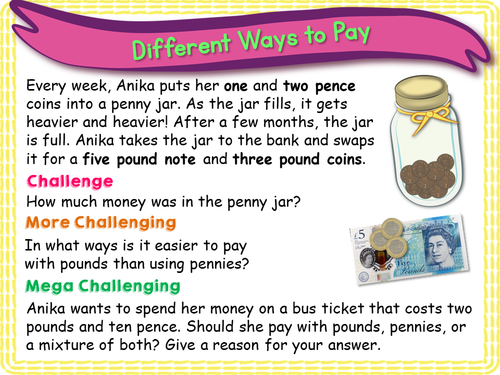































Different ways to pay KS1 PSHE lesson. A one-hour long, very detailed, fully resourced PSHE lesson suitable for KS1. This lesson has been created for Year 2, however, the contents may also suit younger students in KS2 (Year 3).
In this lesson, the students will learn about a variety of payment methods including cash, credit cards, and debit cards. We will look at a selection of unusual payment methods including the use of smartphones, smartwatches and contactless payments.
The students will then go on to use their knowledge to choose the best payment option in a set of scenarios. The lesson includes a starter activity, a set of case studies, a jigsaw activity, and an ‘Articulate’ themed plenary task.
Created to fit the new DfE and PSHE Association statutory 2020 /21 guidelines, the lesson includes a detailed PowerPoint, all editable with accompanying tasks and worksheets.
The lesson has been left editable and is filled with engaging, well differentiated and fun activities. It is designed to be ‘no prep’, so you can just pick it up and use it, although it is still adaptable should you wish to.
Who are EC Resources?
EC Resources are the top TES PSHE providers and are a group of teachers who work together to create easy to use, high quality and editable lessons and units of work. We have created lessons for The Children’s Commissioner, The Bank of England, MACS Charity, Tes, LikeToBe Careers, the Criminal Cases Review Commission (UK Gov) and have also completed PSHE and Citizenship commissions for schools across the UK.
You can contact us at info@ecpublishing.co.uk
Teaching PSHE, RE or Citizenship GCSE next year? Why not join our Citizenship and PSHE teachers Facebook group, with 8000 other teachers, for guidance, advice and resource sharing.
Get this resource as part of a bundle and save up to 36%
A bundle is a package of resources grouped together to teach a particular topic, or a series of lessons, in one place.
Year 2 PSHE - Wider World
**KS1 PSHE - Living in the Wider World - Year 2** A collection of PSHE resources that have been created to cover the 'Living in the Wider World' strand of the PSHE Association’s Programme of Study for KS1. These lessons have been specifically created for use with students in Year 2. They are also suitable for use in schools who have opted to follow the PSHE Association’s Thematic Model for KS1. If you would like to see a sample of our resources, the first lesson in the bundle ([What is the Internet?](https://www.tes.com/teaching-resource/what-is-the-internet-ks1-12597351)) is free to download.
KS1 PSHE - Money
KS1 Money PSHE - Year 2 A collection of money themed PSHE resources that have been created to cover the 'Economic Wellbeing: Money' section of the PSHE Association's Program of Study for KS1. These lessons have been specifically created for use with students in Year 2. They are also suitable for use in schools who have opted to follow the PSHE Association's Thematic Model. The lessons included in this bundle provide materials to comprehensively cover the following KS1 PSHE codes: L10, L11, L12, L13, L15. The suggested lesson sequence is as follows: **What is Money?** A brief history of the evolution of money from the barter system to modern-day currencies. **Different Ways to Pay** Students will investigate different forms of money and ways to pay for things including cash, bank cards and electronic payments. **Earning Money** The students will learn about the different ways that people can get money including employment, gifts, prizes, pension payments for the elderly, and interest from a bank account. **Spending and Saving** The students will learn at the importance of saving, as well as learning practical ways to manage their money. **Wants and Needs** The students will learn the difference between wants and needs, and reflect on the reasons why we can't always have the things that we want.
Something went wrong, please try again later.
This resource hasn't been reviewed yet
To ensure quality for our reviews, only customers who have purchased this resource can review it
Report this resourceto let us know if it violates our terms and conditions.
Our customer service team will review your report and will be in touch.